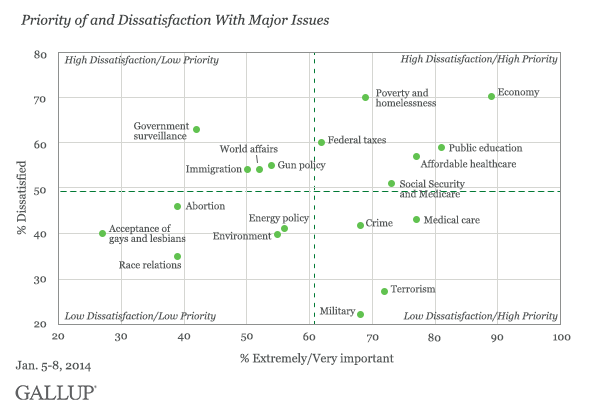Could Congress be coming back into Americans' better graces? The relative lack of bitter partisanship displayed last week as both the House and the Senate passed debt ceiling legislation suggested that elected representatives may be paying attention to the anguished outrage of Americans -- who have been giving Congress the lowest approval ratings in history, even as they named dysfunctional government as the most important problem facing the nation.
This isn't to say that the House and the Senate performed their duties with perfect comity (see here and here). But the proof is in the eating of the pudding, and the legislation got passed in the end.
Along these lines, we have a mini-breakthrough from the public's viewpoint. For the first time since October, Americans do not say that dysfunctional government is the most important problem facing the country. It has been replaced at the top of the list by jobs, which, in turn, is followed by the economy. As memories of the shutdown in October have faded, so have the top-of-mind mentions of problems in government as the nation's top problem.
This February update came prior to the actual votes this past week in Congress, so they were not a proximate cause. But clearly there has been less posturing, grandstanding, and talk about the need to shut down government in order to call attention to the need to save it. Maybe some of that is seeping through to the average American.
Congressional approval for February is at 12%. If one were so inclined, one could say that this is a 33% increase from the all-time low of 9% measured last October. Of course, that would be like saying that a new drug dropped the death rate from some dread disease in half since it went from 2% without the drug to 1% with the drug. Suffice it to say that February's reading on Congress was still very low. But it would not be outside of the realm of possibility to hypothesize that congressional approval might go back up some more in March at the time of our next reading.
We also didn't see a lot of change in Speaker of the House John Boehner's approval rating in the February survey. He's at 32% favorable and 50% unfavorable, just a little more positive than last October, when his favorable rating was 27%.
Debt ceiling issues behind them, representatives in Congress can now turn their attention to other issues, including immigration, which has been receiving a good deal of recent focus. From the people's perspective, immigration is not a high priority, even though there is above average dissatisfaction with the immigration situation in the U.S. This analysis -- from a few weeks ago --shows that immigration is in the upper left-hand corner of the quadrant grid -- meaning that, while it has above-average dissatisfaction, it has below-average priority among Americans.

Americans' instructions for their elected representatives at this point would be to focus first on the economy and related issues, then education, healthcare, the major entitlement reform programs of Social Security and Medicare, poverty and homelessness, taxes, and then perhaps immigration. And, if immigration is going to be tackled, Americans would seem to entreat their representatives to focus on a comprehensive plan, not a piecemeal plan.
